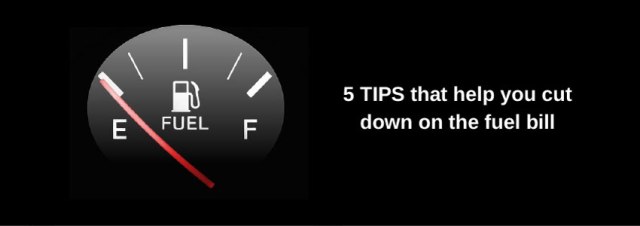[dropcap]G[/dropcap]iven the fact that the cost with fuel is increasing constantly, drivers must find various ways of reducing fuel consumption and implicitly reducing the costs associated with it. Of course the new technologies have an important contribution to fuel saving, but it is still the driver the one who can influence the engine’s “appetite” for fuel. Please see below tips to reduce the fuel bill each time you take the wheel.
- Make sure to have the proper tire pressure
Any driver with experience will confirm the fact that tires under the limit recommended by the car manufacturer represent a danger for the safety of all participants in traffic. Apart from this, the right tire pressure will also increase the car endurance, thus the engine will not have to work more to compensate for the energy lost.
According to the US Department of Energy, an optimal tire pressure can lead to an increase of up to 3.3% in the distance made with the same quantity of fuel. So make sure the tire pressure is always within normal limits to help reduce fuel consumption.
- Pay attention to the periodical maintenance
Any doctor will tell you that it is better to prevent an illness than treats it. The same principle also applies to cars: an improper maintenance will have negative effects on its functioning.
Thus, any defect will decrease engine performance and will increase fuel consumption. Make sure you respect the manufacturer recommendations regarding the intervals between inspections and you will cut down on the fuel bill.
- Reduce the effects caused by air resistance
Any element of transportation that you fix onto your car (roof rack, bike rack) must be removed when it is not necessary. These elements will change the aerodynamics of the car which means that the engine will require a bigger power to go through traffic. This is how you get increased fuel consumption, as well as an increased quantity of exhaust.
- Reduce the car load
Any additional weight in the car will make the engine’s work more difficult, especially at stop and startup. The simplest thing you can do is to remove any additional capacity and to avoid car overloading. You will not only reduce the fuel bill, but also increase passenger comfort and safety.
- Anticipate traffic conditions
There are a lot of tricks for economy driving, some are more efficient, others are less efficient, but the safest approach is anticipation.
By observing and estimating the driving conditions you can reduce the cases of sudden breaking. In some cases, the engine needs to work hard and looses a very big quantity of energy.
By anticipating possible barriers, you can slowly release the gas pedal earlier and the car will slow down without affecting fuel consumption.
If you apply the instructions above, you will manage to save fuel each time you get in the driving seat. Moreover, a study made in the UK between the 1st of February – the 30th of April 2013, on 1103 Mobil 1 users has demonstrated that two out of three users manage to save fuel, while they were using Mobil 1 engine oil.
Courtesy of Star Lubricant





